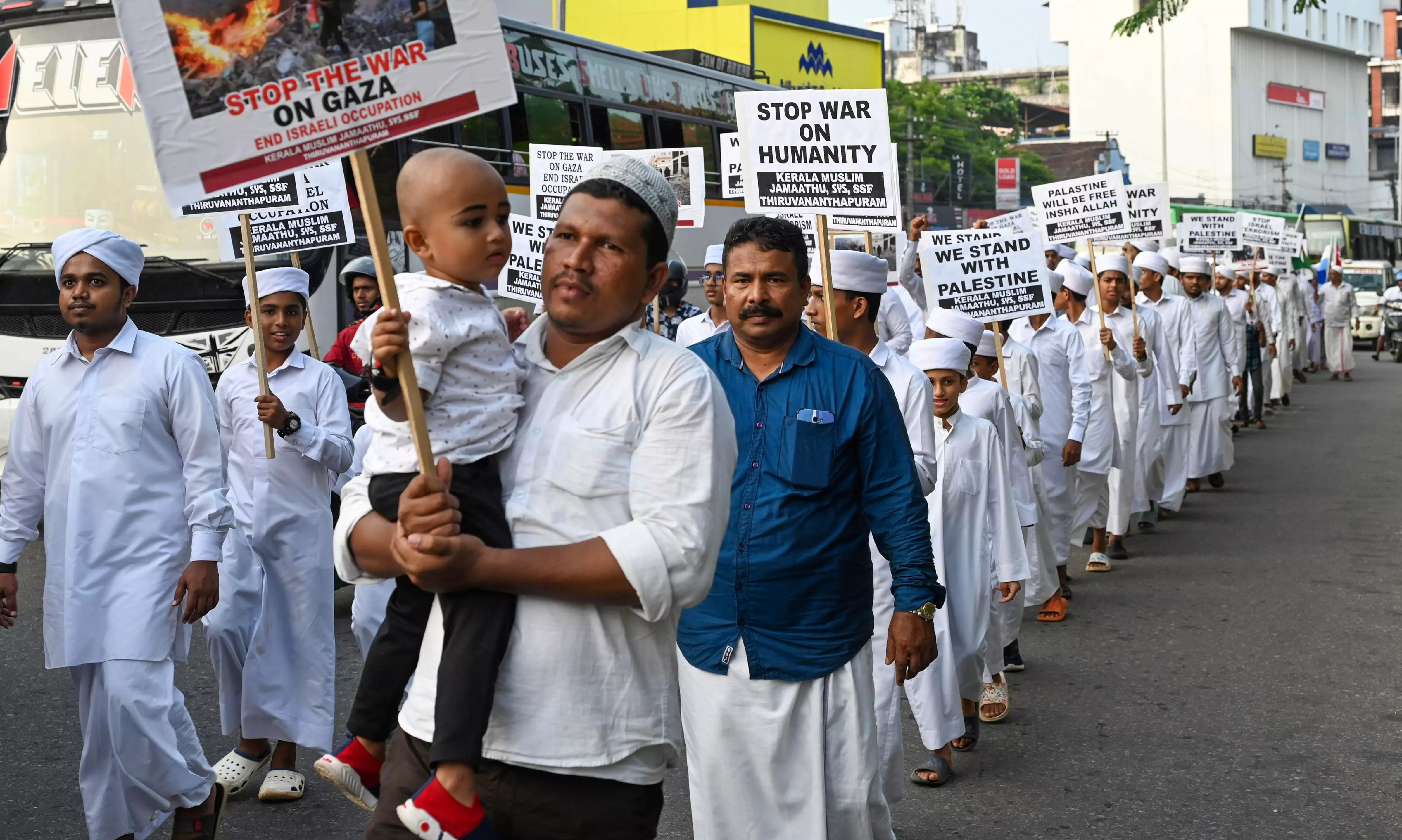
- Home
- India
- World
- Premium
- THE FEDERAL SPECIAL
- Analysis
- States
- Perspective
- Videos
- Sports
- Education
- Entertainment
- Elections
- Features
- Health
- Business
- Series
- In memoriam: Sheikh Mujibur Rahman
- Bishnoi's Men
- NEET TANGLE
- Economy Series
- Earth Day
- Kashmir’s Frozen Turbulence
- India@75
- The legend of Ramjanmabhoomi
- Liberalisation@30
- How to tame a dragon
- Celebrating biodiversity
- Farm Matters
- 50 days of solitude
- Bringing Migrants Home
- Budget 2020
- Jharkhand Votes
- The Federal Investigates
- The Federal Impact
- Vanishing Sand
- Gandhi @ 150
- Andhra Today
- Field report
- Operation Gulmarg
- Pandemic @1 Mn in India
- The Federal Year-End
- The Zero Year
- Science
- Brand studio
- Newsletter
- Elections 2024
- Events
- Home
- IndiaIndia
- World
- Analysis
- StatesStates
- PerspectivePerspective
- VideosVideos
- Sports
- Education
- Entertainment
- ElectionsElections
- Features
- Health
- BusinessBusiness
- Premium
- Loading...
Premium - Events

Israel's existence was considered immoral till the 1980s; today’s arguments in support of Israel are rooted in dogma propounded by Savarkar and Golwalkar
The deathly silence in India – the Union government’s as well as among significant sections of the people – to Israel’s indefensible response of targeting civilians in Gaza, as retaliation for the gory Hamas attack on October 7, is a symptom of what ails India’s domestic politics and the discourse it spawns as well as feeds.
The noiselessness at even earmarked spaces for staging protests is an indication that in India, saying no is unacceptable now. No to anything. Be it choices made by those wielding power, what is rammed down people’s throats as truth, or the decision made, or laws passed, or processes subverted.
The entire populace must perfunctorily look upon themselves as members of the Light Brigade conditioned not to reply and never to question why, while being prepared eternally, to make sacrifices at the neo-royal diktats.
Absence of protests
The self-gag used by many among the conscientious lot of yore is a conspicuous sign of the country’s new power elite using draconian laws and rules, more inflexibly than ever before. It is also evidence of steady depletion – by crossover or by acquiescence – in the ranks of angry young people who resided, till recent decades, in every nook and crevice of India.
Protests were a passion of people who inherited the legacy of the freedom struggle. Defying power was in the DNA of Indians. No longer.
Instead, protests of any kind have been delegitimised and have been declared as anti-national activity, one way or the other.
Absence of outrage, by but a few, on the streets of Indian cities and towns over the ongoing brutal Israeli aggression in Gaza stands in distressing contrast to spontaneous response till the late 1980s. Back then, it was commonplace for Indians to take to the streets after an assault on Palestinian people, territories and organisations. People marched and shouted slogans as expressions of solidarity with Palestine and its people.
Backing Zionism
From a time when it was considered but natural for an overwhelming majority of Indians to support Palestinians in their struggle for a sovereign homeland, backing Israel and Zionists is now depicted as the only politically correct response to events unfolding since the Hamas attack on October 7.
In this specific instance, the tone of the social response was set within hours of the Hamas attack when Prime Minister Narendra Modi put out a statement on X, formerly Twitter: “Deeply shocked by the news of terrorist attacks in Israel. Our thoughts and prayers are with the innocent victims and their families. We stand in solidarity with Israel at this difficult hour.”
Neither was any label affixed to the Israeli response launched that afternoon, nor did Modi stand in solidarity with innumerable civilians, including several thousand children.
In old India, the existence of Israel was considered immoral till well into the 1980s. Blame for its creation was apportioned among the western nations for having forced out Palestinians from their homes and resettled Jews on Arab land. The justification for this act of inhumanity was essentially a guilt-ridden collective’s repentance for brutalities in Adolf Hitler’s Germany. The homeland for the Jews was also secured as an act of atonement of former Allied powers and post-wartime partners because they never treated the community as equals to the Christians.
Till the late 1980s, Indians commiserated with the Jews, embraced them as their own wherever the miniscule community made their homes in the country. But they never accepted the needless penalisation of the Palestinians to find a land which the Jews alone could govern.
Mahatma Gandhi's view
Public unanimity almost voiced a few core assertions of Mahatma Gandhi in an article in the Harijan in November 1938. He confessed that “apart from the (personal) friendships,” there was, “common universal reason for (his) sympathy for the Jews.” He added that German persecution of the Jews had “no parallel in history”.
Yet, Gandhiji unambiguously stated that his understanding of the Jewish plight did not make him blind “to the requirements of justice. The cry for the national home for the Jews does not make much appeal to me...Why should they not, make that country their home where they are born and where they earn their livelihood? Palestine belongs to the Arabs in the same sense that England belongs to the English or France to the French. It is wrong and inhuman to impose the Jews on the Arabs...”
Till the 1980s, the consensual public opinion was that Gandhiji was correct. Those who disagreed with this viewpoint did not have the courage to articulate their viewpoint freely. That was the time when standing with the downtrodden and the shackled was a matter of pride.
It was also the time when Yasser Arafat was treated like a hero. Those who secured invitations to one of the several receptions for brief interactions with him, like this writer was in early 1980, shared their experiences with not so lucky fellow travelers.
All this has been reversed and what Gandhiji explained as the condemnable strategy of the Nazis is now presented as the path India must choose: “Germany is showing to the world how efficiently violence can be worked when it is not hampered by any hypocrisy or weakness masquerading as humanitarianism.”
Savarkar's stand
Today’s India is witness to unabashed and no-nonsense calls by the political leadership which are endorsed by the faithful, to abandon humanism and a morally correct path because it is a symptom of weakness.
Much of today’s arguments while justifying the backing to Israel and Zionists are rooted in the past, in the dogma propounded by VD Savarkar and MS Golwalkar. It was the former who called for “unrestricted re-colonisation of Palestine by the Jewish people to whom alone it belongs as their Mother Land as well as their Holy Land”. This may sound inconsistent when juxtaposed with what Savarkar seemed to assure his audience several years prior to this assertion.
Academician Vinayak Chaturvedi, author of the incisive book, Hindutva and Violence: V. D. Savarkar and the Politics of History, recalled that Savarkar in his Hindu Mahasabha presidential address in 1938 in Nagpur assured the audience that “(I)f we Hindus grow stronger in time these Moslem friends of the league type will have to play the part of German-Jews”.
Chaturvedi thereafter asked whether Savarkar was conveying the sense that “Hindus in the Indian state had a plan for Muslims inspired by the Nazi persecution of Jews in Germany?”
Echoes of Savarkar’s views, several similar assertions were made by Golwalkar too, are found in toxic posts of the Hindutva social media brigade. Modi’s first response, to dub the Hamas attack as terrorist attack, too evolved from his decades-long engagement with views of Savarkar and Golwalkar. As in the case of Benyamin Netanyahu, the success of Modi’s politics has been based on falsification of history and often basing it on mythology.
Despite the subsequent correction by the Indian government, the first responses remain the entrenched beliefs of the rank and file of the Sangh Parivar.
The change in the response of India and its vocal people to assaults on Palestinians is but a small fragment of all that has altered in India. One viewpoint that remained embedded in most social media posts of Hindu rightwing groups was that and attack on Arab-Palestinians was effectively at assault on Indian Muslims.
Enhanced support for Zionism
Greater support for majoritarianism in India mirrors the enhanced support for Zionism along with its practitioners and vice versa. It would, however, be wrong to assume this as a post-2014 phenomenon. It has to be recalled that India established full diplomatic relations with Israel in 1992 when PV Narasimha Rao was the Prime Minister.
The middle-class driven support for the Zionist State is in favour of toning down support for Palestinians and their cause has risen steadily in the past three decades. With the support of the Indian state, this has become the dominant thinking.
(The Federal seeks to present views and opinions from all sides of the spectrum. The information, ideas or opinions in the articles are of the author and do not necessarily reflect the views of The Federal.)


